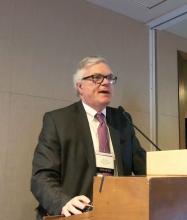LAS VEGAS – Recent studies of human microbiota are yielding new insights that could improve the diagnosis, evaluation, and treatment of digestive diseases, according to Eamonn M. Quigley, MD.
There are “many possibilities” for new therapeutics that focus on the assemblage of bacteria and other microorganisms present in the human body, said Dr. Quigley, director of the Lynda K. and David M. Underwood Center for Digestive Disorders, Houston Methodist.
Moreover, microbiota have factored in specific digestive diseases in multiple recent studies. “What remains to be shown, for the most part, is if [changes in microbiota are] causal,” Dr. Quigley said at the inaugural Perspectives in Digestive Diseases meeting held by Global Academy for Medical Education.The role of the microbiota has already been well established, for example, in cases of Helicobacter pylori infection and Clostridium difficile–associated disease. “They’re the classics,” Dr. Quigley told attendees. “They’re the templates for studies in other diseases.”
Dr. Quigley shared results of one recent treatment-related study that he said could have important implications for sepsis prevention in infants. The randomized trial showed that administration of a particular synbiotic – a probiotic plus a prebiotic substance – may have reduced sepsis incidence among infants in rural India.
The study comprised 4,556 infants with no signs of sepsis who were given an oral synbiotic preparation of Lactobacillus plantarum plus fructooligosaccharide. The composite outcome of sepsis and death was reduced in the treatment arm of the study (risk ratio, 0.60; 95% confidence interval, 0.48-0.74).
Based on that outcome, investigators said in their report that the preparation could prevent a “large proportion” of neonatal sepsis in developing countries.

